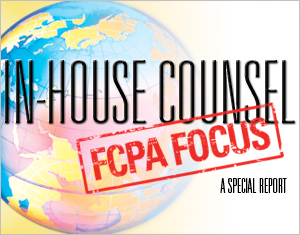John E Davis

November 05, 2021 | National Law Journal
DOJ's Revised Guidance on Corporate Enforcement Policies Expands Reach on Potential White-Collar Crime RecordsThe DOJ's revised guidance on key corporate enforcement policies substantially expands its reach on white-collar crime. Having in place a risk-based, fully implemented, rigorously monitored compliance program is the best protection a company can have.
By John E. Davis
5 minute read

March 23, 2009 | National Law Journal
When vendors collapseBy asking the right questions up front and by using appropriate contractual language with e-discovery vendors, companies and firms can mitigate and possibly avoid the risk of loss or degradation of services — along with conflicts that can arise from dealing with financially at-risk vendors.
By Wayne C. Matus, Joshua B. Konvisser and John E. Davis / Special to The National Law Journal
11 minute read

June 06, 2011 | National Law Journal
Is there a trend away from FCPA compliance monitors?Recent dispositions have signaled a possible move toward self-policing and direct reporting to agencies.
By John E. Davis and Jacqueline L. Ferrand
9 minute read

May 13, 2013 | National Law Journal
What Did Officer Know, and When Did He Know It?That was the deciding factor in two recent FCPA prosecutions in New York's Southern District.
By John E. Davis, Jian Bin Gao and Leila Babaeva
7 minute read

March 24, 2009 | Corporate Counsel
What to Do When Vendors Start FallingIn the current economic downturn, law firms can mitigate the risk of loss of services that can arise from dealing with financially at-risk electronic discovery vendors. Ask the right questions and use appropriate contractual provisions to manage the unexpected changes affecting vendors.
By Wayne C. Matus, Joshua B. Konvisser, John E. Davis and Kristie Chon
11 minute read

October 31, 2008 | Legaltech News
Do Your Searches Pass Judicial Scrutiny?Given escalating volumes of ESI and the general impatience of courts with e-discovery mistakes, counsel and their clients soon may have no choice but to move beyond traditional Boolean search techniques. Courts have already put practitioners on notice of this emerging obligation.
By Wayne C. Matus and John E. Davis
14 minute read
October 27, 2008 | New York Law Journal
Does Your Search Pass Judicial Scrutiny?Wayne C. Matus, a partner at Pillsbury Winthrop Shaw Pittman, and John E. Davis, a senior associate at the firm, write that given escalating volumes of ESI, with no end in sight, and the general impatience of courts with e-discovery mistakes, counsel and their clients soon may have no choice but to adopt discovery tools that are more efficient and precise than traditional Boolean search techniques. Courts have already put practitioners on notice of this emerging obligation. Combining measured approaches to search methodologies with advanced techniques can greatly assist in the organization of ESI and the cost-effective conduct of litigations and investigations. The future is now for these state-of-the-art search techniques.
By Wayne C. Matus and John E. Davis
14 minute read

March 24, 2009 | Law.com
What to Do When Vendors Start FallingIn the current economic downturn, law firms can mitigate the risk of loss of services that can arise from dealing with financially at-risk electronic discovery vendors. Ask the right questions and use appropriate contractual provisions to manage the unexpected changes affecting vendors.
By Wayne C. Matus, Joshua B. Konvisser, John E. Davis and Kristie Chon
11 minute read
More from ALM
- Scan In Progress: Litigators Leverage AI to Screen Prospective Jurors 1 minute read
- Legal Speak at General Counsel Conference East 2024: Match Group's Katie Dugan & Herrick's Carol Goodman 1 minute read
- Legal Speak at General Counsel Conference East 2024: Eric Wall, Executive VP, Syllo 1 minute read



